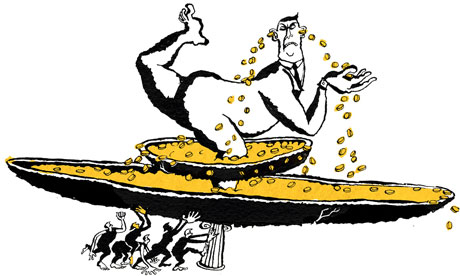Ignore their howls of protest.
They took home unheard of sums. Only in Britain do ministers dance to their tune. But public fury cannot be defied for ever

Illustration by Belle Mellor
The peasants are revolting across Europe. They want bankers' blood and mean to get it. Until now, public response to the credit crunch has been one of general bafflement and wrist-slapping. The banks persuaded the world it was all an act of fate. As it was, they were too big to fail and their leaders too saintly to atone for it. For four years, British banks were showered with nearly half a trillion pounds of public and printed money. They duly recovered and stayed rich, while everyone else went poor.
The worm has turned. The banks and government alike have failed to deliver recovery. The people want revenge, and have found it – of all places – in the European parliament. It has declared that EU bankers cannot get bonuses bigger than their salaries, or twice as big if shareholders approve. This applies wherever EU bankers work, and to any overseas banker working in the EU.
Meanwhile, a Swiss referendum now requires top executives to seek explicit shareholder approval for their pay, with a ban on golden hellos and goodbyes. The Netherlands is talking of a tighter 20% cap on bonuses. Even laissez-faire Britain has seen the National Association of Pension Funds demand that boards keep executive pay rises down to inflation.
Europe's once omnipotent banking lobby has been all but neutered by the scale of scandal. The German government caved in to the EU parliament under pressure from the opposition Social Democrats. This was after the Libor scandal revealed Deutsche Bank cutting one trader's bonus by £34m, thus implying a staggering original sum. The Swiss campaign was kicked into life by the drugs firm Novartis giving its departing chairman a $76m gift. Some 68% of Swiss voted for the new curb.
Only in Britain do ministers still dance to the bankers' tune. Last month RBS executives brushed aside their state shareholder and paid themselves £600m in bonuses after posting a £5bn loss. Loss-making Lloyds dipped into its till and gave senior staff an extra £365m. Money-laundering HSBC announced 78 of its London executives would take home more than £1m each. They all say bonuses were unrelated to fines or losses, but they always say that. George Osborne was humiliated in Brussels on Tuesday by having to plead their fruitless cause.
Last year the City of London's much-heralded "shareholder spring" got nowhere. Revolts against executive pay at WPP, Barclays, Trinity Mirror and elsewhere had little noticeable impact. While overall pay stagnated, that of top executives rose 12%. Opinion polls showed the public overwhelmingly hostile to top pay. Only the government and the London mayor stand between the very rich and a furious public. The peasants' revolt means that even British ministers cannot defy opinion for ever.
The reality is that the banking community has allowed this thirst for revenge to build up for over four years, and it just did not care. Ever since the 1980s and financial deregulation, the profession took home sums of money unheard of in any other line of work.
This had nothing to do with free markets, except within a tight group of high-rolling traders. Modern bankers derive "economic rent" from exploiting oligopolistic cartels in financial services, with shareholders kept at one remove. The astronomical traders' bonuses are asymmetric returns on cash that properly belongs to depositors and shareholders whose money bears the risk. In any other business such bonuses would be regarded as theft from the firm.
For four years the British government – Labour and the coalition – huffed and puffed but was too terrified of the banks to act. Regulators were suborned by lobbyists and ministers, their offices packed with seconded bankers, and did as they were told. They gave huge sums to the banks in the belief that this was benefiting the demand economy. In Britain, some £400bn of cash was "pumped into the economy" via the banks. They merely traded or hoarded it, to their ever greater enrichment. The money vanished. A thousand pounds handed to every British citizen would have had more impact on the economy.
Last year, as if learning nothing, the Treasury gave the banks another £80bn to boost business and mortgage lending. This week it was predictably revealed that lending to small businesses actually fell as result. It was like giving money to a drunk and telling him to support his children. Never in the history of money can policy have been so glaringly inept. The banks laughed.
No trade unions are fiercer in defending their interests than the rich professions. As we saw this week with lawyers, cut their largesse and they threaten to take it out on the poor, the economy, the government, everyone. The banks howl that the bonus cap means their greed will go "offshore". This seems exaggerated. But the EU curbs could possibly see the start of the high-rollers moving out of over-regulated Europe towards the Americas and Asia.
This would not be wholly good news for Britain: finance has been the boom industry of the past quarter-century. But more likely is that the more toxic activities will go, and that is no loss. Either way, the banks have themselves to blame. They flew their golden wings too near the sun, and rage has melted them. They have only one plea on their side. The culture of greed in the City was nothing to the culture of ineptitude at the Bank of England and the Treasury. They pumped out the money. Never in British economic history can so much have been so wasted on so fruitless a cause. And still no hint of remorse.

No comments:
Post a Comment